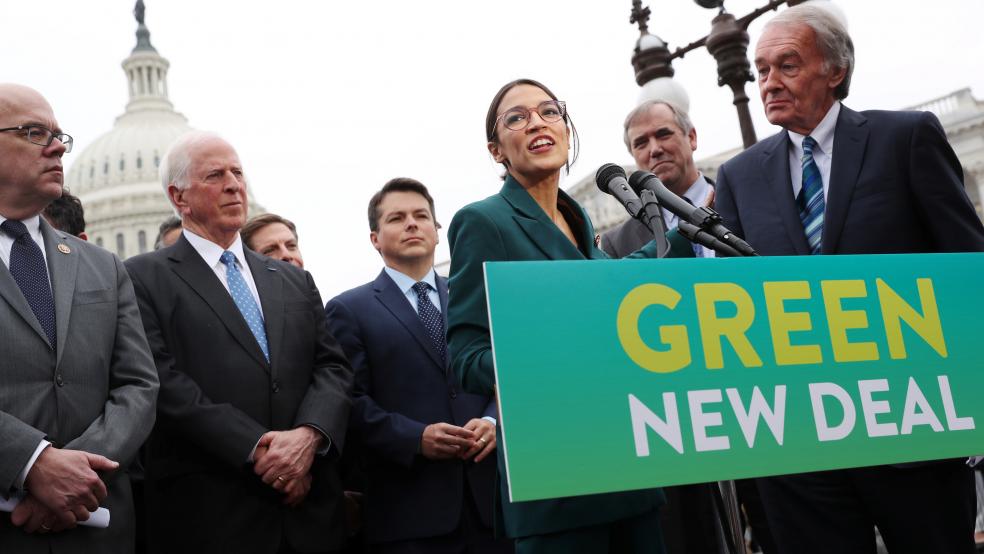Rep. Alexandria Ocasio-Cortez (D-NY) and Sen. Ed Markey (D-MA) released their much-anticipated proposal for a Green New Deal Thursday. Framed as a response to the challenges of global warming, the 14-page, non-binding resolution — which you can read here — calls for a “new national, social, industrial, and economic mobilization on a scale not seen since World War II and the New Deal era.”
The resolution reads like a “progressive manifesto,” says Vox’s Ella Nilsen, and touches on all aspects of the economy as it proposes a massive collective response to climate change, though its leaves the details to future bills that would define how the ambitious goals are to be achieved.
What it wants to do: In broad strokes, the resolution calls for a 10-year national effort to achieve a wide array of goals, including:
- net-zero greenhouse emissions
- millions of high-wage jobs
- investment in 21st century infrastructure
- an end to monopolies
- clean manufacturing
- sustainable farming
- affordable housing
- affordable health-care
- affordable education.
The list is hardly exhaustive, and it’s safe to say that there are few economic, social and political institutions that would go untouched should a Green New Deal be put into motion.
How much it would cost: In a press release, Ocasio-Cortez said, “The level of investment required to make the Green New Deal successful is massive,” but the resolution says very little about specific costs.
How they would pay for it: Ocasio-Cortez explicitly rejects the idea of paying for the Green New Deal in any conventional sense, framing it instead as a collective investment for the country as whole. "We will finance the investments for the Green New Deal the same way we paid for the original New Deal, World War II, the bank bailouts, tax cuts for the rich, and decades of war — with public money appropriated by Congress," her press release says. "Further, government can take an equity stake in Green New Deal projects so the public gets a return on its investment."
The plan would rely in large part on deficit spending, says economist Noah Smith, noting that the authors cite a Forbes article on modern monetary theory, which provides a theoretical framework for the large-scale issuance of government debt in some circumstances.
Who’s backing the proposal: Cosponsors include Democratic presidential candidates Sens. Cory Booker (NJ), Kirsten Gillibrand (NY) and Kamala Harris (CA), as well as Sens. Bernie Sanders (I-VT) and Jeff Merkley (D-OR). More than 60 House Democrats are also on board, and many progressive groups have expressed their support. More broadly, the majority of voters in both parties have expressed support for a Green New Deal, although the results predate the release of this specific resolution.
Who isn’t: Republican lawmakers and pro-business groups were quick to reject the proposal — no surprise given its call for increased government spending and its obvious threat to the fossil fuels industry. The Job Creators Network, a conservative advocacy group backed by Home Depot co-founder Bernie Marcus, released a statement that hit many of the basic talking points on the right: “This ‘Green New’ Deal is really a ‘Green RAW Deal’ that will devastate our economy, and will be especially harmful to small businesses, JOB CREATORS and hard-working Americans. The ‘Green Raw Deal’ simply takes the failed ideas of socialism and wraps them in a different color. Socialism takes, capitalism creates. America does not want to be like Venezuela and never will be so long as our political leaders stand up for our ideals. We call on all reasonable Members of Congress to reject this madness.”
White House economic adviser Larry Kudlow said that progressive proposals including the Green New Deal would “destroy entire chunks of the economy.”
But Republicans aren’t the only ones criticizing the sweeping proposal. Plenty of moderates have their doubts as well. Perhaps most prominently, House Speaker Nancy Pelosi (D-CA) said Wednesday that she saw the Green New Deal as one “suggestion” among many that lawmakers would consider, and referred to the effort dismissively as “the green dream or whatever they call it,” although she changed her tone a bit on Thursday when she welcomed “the enthusiasm that is there” around the resolution.
Describing climate change as a “deadly serious” problem, Pelosi announced the members of a new special select panel on climate change Thursday. Ocasio-Cortez was notably not included.
The big picture: The proposal released Thursday is a broad declaration of intent, not a functional piece of legislation. The Washington Post’s Philip Bump said that the resolution is “a vision of what the economy should look like, predicated on the changes that global warming will necessitate. It’s framed as being about the environment. It’s much, much more than that.” Vox’s David Roberts described the proposal as the “opening bid” in a political effort that will likely take years to produce concrete results.




